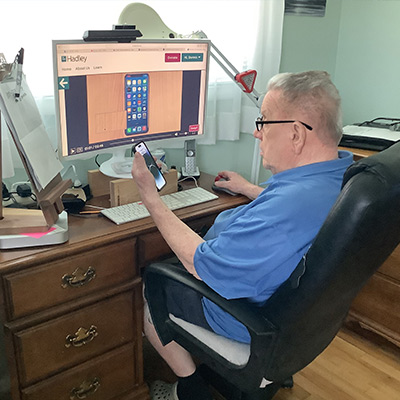Dennis Devitt is a retired educator from Lombard, Illinois who taught English as a second language for many years. Reading has always been a passion of his, so when macular degeneration made that difficult, Dennis switched to e-books where he could enlarge the font. But it got to the point where his eyes would bother him after reading his e-book. So, he was thrilled to find talking books as an alternative. “I go through a cartridge probably every week, and I find them very interesting. It keeps my brain active. I really enjoy that and use it every day.”
The free digital talking book player Dennis loves is available to anyone with a visual impairment and is just one of the tools he discovered over the past few years.
When Dennis began to lose his vision, his wife jumped into research mode, learning as much as she could about macular degeneration. She found help in the form of the Spectrios low vision clinic in Wheaton, Illinois and encouraged Dennis to make an appointment. There Dennis learned that his vision had diminished to the point of being legally blind. “Well, that was a shock to hear that my vision is that bad,” Dennis recalls.
At Spectrios, Dennis also learned that, as a veteran, he qualifies for low vision help from the department of Veterans Affairs (VA). At the Hines VA near Chicago, Dennis learned which pieces of equipment could help him the most and how best to use those tools. “Between Hadley, Spectrios, and the VA, I’m able to pick up a lot of things that are available to me. It’s made my life more livable.”
Hines VA also introduced Dennis to the white cane and encouraged him to try it out. He was hesitant at first, “I thought, I can’t see why I’d use that. I see enough. I don’t have to do that.” But the staff member mentioned “You’re legally blind. It’s a way to let other people know that — in case you need help. If you don’t walk around with a cane, everybody thinks you can see everything.”
The more he considered that, the more it made sense to him. “Actually, I can’t recognize faces until I get within maybe two or three feet of the person,” Dennis explains. “And I still don’t recognize enough of them to discern whether they’re happy or sad or whatever. So, by carrying around the cane, at least it lets people know that if I accidentally bump into them — at least they know why.”
“There’s a lot of help out there for people with vision loss, but you have to search them out and be open to them,” Dennis reflects.
Dennis found Hadley through an online search and enjoys our podcasts and learning tips and tricks from us as well. He specifically loves the approach we take to our workshops. “The small snippets cover things so well. And the presenter voices are easy to listen to,” he notes. Unlike his experience with many YouTube videos, Dennis found, “with Hadley, I can visualize along with them and pick up what they are describing.”
To date, Dennis has taken more than 100 Hadley workshops, mostly on using everyday tech tools. He also takes the time to leave comments after completing a workshop, helping us better understand what parts of a workshop he found most helpful. This feedback informs future development efforts and is therefore invaluable to Hadley. For that reason, Dennis is being recognized this quarter for his contributions to the Hadley community.
Thank you, Dennis!
